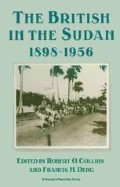Abstract
The early years of British rule in the Sudan were primarily devoted to establishing security, political administration and stabilising the economy. Military officers supervised the customs offices, police and prisons during the first decade of the twentieth century. Gradually, however, the civilian administrative officials replaced the military officers. The vast size of the Sudan combined with slow and difficult transportation encouraged a variety of ‘active and ingenious men, dropped into remote places’, to devise their own methods for governing the Sudanese. From 1900 to 1920 the central government struggled to standardise and finance these conflicting systems of administration in a diverse land with a contrast between North and South that remained an irreconcilable dilemma throughout the Condominium.1 By 1914 the North was reasonably peaceful, even prosperous, but many of the Southern Sudanese still remained beyond the administrative control of the government in Khartoum while others continued to be embroiled in tribal disputes and outright resistance to British authority.
His day would start at dawn with a gentle awakening shake from his house-boy bringing him a cup of tea.
E. G. SArsfield-Hall
Access this chapter
Tax calculation will be finalised at checkout
Purchases are for personal use only
Preview
Unable to display preview. Download preview PDF.
Notes and References
J. R. P. Sandford succeeded Robin Baily as District Commissioner, Shendi. Sandford died at Khartoum on 19 Jul 1916, Baily Misc. letters, SAD.
Sir George Schuster to Sir Harold MacMichael, 1927, quoted in Harold MacMichael to all Governors, 12 Mar 1928, Mongalla, 1/2/1, Central Records Office, Khartoum (CRO).
Harold MacMichael to all Governors, 12 Mar 1928, Mongalla, 1/2/1 (CRO).
Transcript of an interview with Sir James Robertson by Dame Margery Perham, 11 Jul 1966, Rhodes House Library, Oxford. We are most grateful to Sir James for permission to quote from the transcript of this interview.
Editor information
Editors and Affiliations
Copyright information
© 1984 Robert O. Collins and Francis M. Deng
About this chapter
Cite this chapter
Schoettler, G.S. (1984). The Genial Barons. In: Collins, R.O., Deng, F.M. (eds) The British in the Sudan, 1898–1956. St Antony’s/Macmillan Series. Palgrave Macmillan, London. https://doi.org/10.1007/978-1-349-06960-6_4
Download citation
DOI: https://doi.org/10.1007/978-1-349-06960-6_4
Publisher Name: Palgrave Macmillan, London
Print ISBN: 978-1-349-06962-0
Online ISBN: 978-1-349-06960-6
eBook Packages: Palgrave History CollectionHistory (R0)

